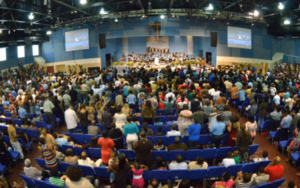“When you look at the history specifically of the African American culture,” Dr. Brenda Richardson Rowe says, “you see that the foundation of all our information comes from our pastors, and our faith leaders.”
 This past summer, we checked in with God’s Way Christian Baptist Church of Taylor, Texas, one of 11 faith-based organizations to receive funding from the Hogg Foundation’s African American Faith-Based Education and Awareness Initiative (Faith-Based Initiative) grant, to learn about their Wellness and Empowerment Community Ministries.
This past summer, we checked in with God’s Way Christian Baptist Church of Taylor, Texas, one of 11 faith-based organizations to receive funding from the Hogg Foundation’s African American Faith-Based Education and Awareness Initiative (Faith-Based Initiative) grant, to learn about their Wellness and Empowerment Community Ministries.
What we learned from God’s Way church leaders and congregants proved that the Faith-Based Initiative’s goal—to start or strengthen dialogues about mental health in faith communities—had, thanks to their hard work and uncompromising vision, been accomplished!
Now that the grant, which was launched in 2014, has officially come to a close, this week’s episode of our Into the Fold podcast unpacks some of the challenges and achievements of the grantees. Here to represent them are Dr. Brenda Richardson Rowe, licensed professional counselor at Harmony Counseling Center in Dallas, Texas, and Dr. Dennis Young, pastor at Missouri City Baptist Church in Missouri City, Texas.
Stigma in Faith Circles
“Mental health is truly everybody’s business,” Dr. Rowe says—and African American communities of faith are no exception.
For many—especially those without access to mental health services—faith circles are places of refuge, with pastors and clergy tending to the emotional needs of their congregants as much as their spiritual ones. Long-held stigma, however, often keeps conversations about mental health conditions behind closed doors, leading to shame and misunderstanding.
That’s why it’s so important, Dr. Rowe tells us, that we equip pastors “with the information they need to serve their congregations and communities.” Faith leaders, no matter the size of their following, are influencers; and when they preach mental health lessons from the pulpit, people listen.
Inclusion through Dialogue
Faith leaders, depended on for light in dark times, inevitably face mental health challenges of their own. For Dr. Young, the Faith-Based Initiative grant has strengthened his personal capacity for rising to the occasion. “It has helped me to step back and set up a self-care program for myself, recognizing what’s going on with others,” he says.
The appeal of mental health education, Dr. Rowe finds, grows when dialogues use inclusive language. “Being aware of how you title programs,” she says, “how inclusive you are, as opposed to pointing to a specific population, helps you draw people to the information you’re trying to provide for them.”
By honoring individual experience and testimony, inclusive mental health dialogues make room for difference—giving participants the words and space they need to express their vulnerabilities without shame. “Our congregation has actually gotten closer,” Dr. Young says, speaking about the impact of the grant on his church. “We’ve been offering several sessions, and each session the attendance grows.”
Dr. Rowe was emboldened by the support, using her skills as a minister of counseling to reach out to small churches and incorporate them into a broader sharing of knowledge. “The initiative helped me to expand beyond the church,” she says, “and beyond the community I was already serving.”
In four years, the Faith-Based Initiative grantees haven’t just strengthened mental health dialogues in their respective places of prayer and worship. They’ve created networks that, through the power of spiritual kinship and word-of-mouth resource-sharing, can keep the conversation going.
Learn more about our podcast and check out other episodes!
